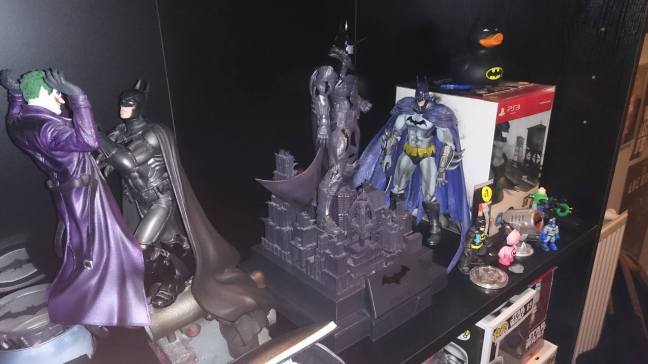
I have developed a very strong cultural and economic fan capital around my interest in the character of Batman. I have done this through accumulating knowledge and memorabilia across different mediums, over many years.
Part of the reason for this is to enunciate that I have an interest in this character, and more broadly superheroes in general, to the people around me. It’s an expression of who I am as a person and what I’m interested in.
John Fiske (1992) discusses the characteristics of fandom under three headings: discrimination and distinction, productivity and participation and capital accumulation.
This idea of ‘enunciative productivity’ is another way of constructing a social identity through the way you dress and present yourself. (Fiske,1992,pg38). Wearing t-shirts with Batman logos emblazoned on them is the most prominent, non-verbal way of expressing my fandom in society.
Just the other day I spent around £40 on official Batman v Superman: Dawn of Justice t-shirts, so when the movie releases, I can showcase I’m apart of the community that is excited for it. I’ll feel apart of this huge cultural event.
The same can be said for most of the Batman memorabilia I have purchased. I buy these items to maintain my personal cultural social identity, but also to express to others what my fandom is and to what extent it takes. Fiske describes this commercialised desire as “fans, like buffs, are often avid collectors, and the cultural collection is a point where cultural and economic capital come together.” (Fiske,1992,pg43)
I think it’s almost like self-reassurance. Sometimes I feel like I have to purchase memorabilia to keep up appearances in a way, to continue to prove to myself and others that I am indeed a fan of this particular thing. If I can’t communicate my interest with others, what proof is there that I’m a fan at all beyond my word of mouth?
Fiske discusses how there is so much discrimination and distinction in fan cultures. A firm line is drawn by fans between what makes somebody a fan or not, and society recognises this assertive discrimination. (Fiske,1992,pg35).
It may not by direct, but if a community of fans are throwing trivia around that you are supposed to know, or discussing an episode that you should of watched but haven’t, it can be incredibly degrading.
You are judged based on what you know and how you express it. Me turning around to people and saying I can tell you the time Bruce Wayne’s parents died, may seem a little sad, but certainly rewards credibility within the specific community of fans that like Batman.
I have built up this capital over time by quoting lines from movies or comics, purchasing memorabilia and posting images of them on social media. It all plays a part in constructing a cultural identity both for yourself and others.
Fiske, J. (1992) ‘The Cultural Economy of Fandom’. In Lewis, L. A. (Ed.) The Adoring Audience. London, Routledge, pp30-49.


